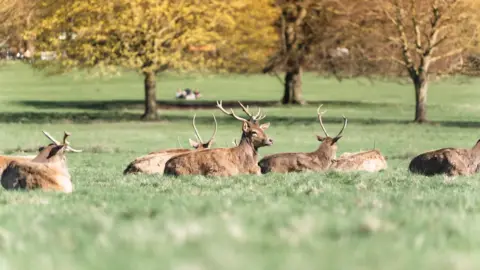Charity calls for wildlife crime punishment reform
 Getty Images
Getty ImagesA charity is calling for the government to change the way wildlife crime is recorded, investigated and punished.
In a new report, the International Fund for Animal Welfare (IFAW) said there was a "confusing patchwork" of wildlife legislation, inconsistencies in gathering evidence and a lack of resources.
“This research tells the demoralising tales of enforcers often fighting losing battles against criminals enjoying a lucrative free-for-all to exploit wildlife for greed," the IFAW said.
The Home Office said funding for the issue would be decided in the government's spending review.
The IFAW wants the government to make wildlife crime a "notifiable offence" and is calling for a central database to report and record all incidents.
Police forces must inform the Home Office of notifiable offences, which then uses the reports to compile crime statistics.
The IFAW said the current lack of centralised recording of wildlife crime made it hard to get a clear view of the situation.
It also wants more mandatory legal training, sentencing and prosecution guidelines, further guidance on gathering evidence, more law enforcement and more public awareness.
The publication of the report follows research from the University of Gloucestershire and Nottingham Trent University.
The report said figures suggested just 6% to 14% of reported wildlife crimes in Scotland, the only UK nation to compile annual reports on such activity, resulted in a decision to prosecute.
'System set to fail'
Dr Angus Nurse, the research lead at Nottingham Trent University, now at Anglia Ruskin University, said research "consistently showed wildlife crime doesn't get the priority or the resources it deserves".
Catherine Bell, from the IFAW, added that the UK had a "system set to fail".
“Wildlife crime presents low risk – high reward opportunities to organised gangs, who are often linked to drugs, firearms and other violent offences," she said.
A Home Office spokesperson said anyone exploiting or deliberately harming wildlife "should face the full force of the law".
“It is for Chief Constables and elected Police and Crime Commissioners to allocate their resources to tackle local priorities.
“However, the government directly funds the National Wildlife Crime Unit which provides intelligence and support to police forces protecting our precious wildlife,” they added.
Follow BBC Gloucestershire on Facebook, X and Instagram. Send your story ideas to us on email or via WhatsApp on 0800 313 4630.
